- Home
- Scott Turow
The Laws of Our Fathers Page 21
The Laws of Our Fathers Read online
Page 21
The Eddgars' household was in turmoil. The Faculty Senate voted to conduct hearings beginning April 1 to determine whether Eddgar should be expelled for inciting to riot at the ARC. The role of martyr suited Eddgar well. Anger, sacrifice, discipline -all his favorite attributes were called for. His public appearances were characterized by an intense nervy excitement. He stridently denounced the university's case against him as hokum, designed to stifle dissent. But at home, his mood was more ambiguous. He worried out loud about snitches. June was even gloomier, clearly depressed by what the authorities were about to dish out. She took to quoting from various Greek dramas she'd played in at college.
I stayed busy with Nile and had also advanced somewhat at After Dark. I now swept the office and was also getting up at 5:00 four mornings a week to fill the vending machines around the Bay Area. The publisher of After Dark was a potbellied, bald-headed guy in polyester pants named Harley Minx. I liked Harley and found him somewhat touching in his frank desperation to experience the life of lust imagined in his paper. In idle moments in the office, I'd recounted some of my Doobie Hour fantasies to him and Harley had persuaded me to write a couple down. He decided to run them as a sort of serialized comic strip, each tale stretching over three or four issues and accompanied by R. Crumb-like cartoon panels. The column was called 'Movie Trips,' and except for Harley's warm support drew virtually no attention. However, the sight of my words in print was dizzying.
The initial serial concerned a leader named A Bi and his son, IB2, and was set in the year 2170. By then, I suggested, medicine would have scored its ultimate triumph, allowing humans to live forever. As a result, the earth and the habitable planets would become a reeking overpopulated mess. Procreation was allowed solely with governmental license, and then only if one member of the parenting couple agreed that twenty-one years later she or he would die. In my story, A Bi, a man of some importance, decided that he could not keep that bargain, and so he set about pursuing the only alternative allowed under the law - sacrificing his child. At the end of the first installment, A Bi convinced IB2 to join the Fortieth SkyFighters, knowing that danger and even death often accosted the members of the galactic militia.
' This is like a parable or something,' Lucy said, when I brought the first edition home to Doobie Hour.
'Something,' I answered. Sonny put the paper down sadly, her eyes, when they found mine, flooded with shared misery.
'What happens to the son?' she asked.
'We'll find out soon.'
By now, I was in an endgame with my draft board, employing every gambit in a last-chance hope that a sudden breakthrough in the Paris peace talks would allow Nixon to end the war. I had filed for reconsideration of my C O and contested the results of my physical. When all that failed, I could transfer my induction to Oakland. That would provide me a few extra weeks. But the point - which never left me, even when I was driving my delivery route or laughing with Sonny - was that I was going. I was gone. When I received my draft notice, I would point the Bug north. That could be late April at best. I had gathered maps from all the motor clubs. I had spoken with the resisters' organization. At the border, I would say I was entering for a visit. Then I would stay. I knew a guy who knew a guy. He'd hire me for day wages at a nursery outside Vancouver. I would be digging and planting as long as the war lasted. After that, who knew? Often, I was wild with anger. The thought of abandoning the US - its crazy turbulence, into which I felt woven like a fiber - of giving up my friends, my food, my music, of being unable to visit my parents as they aged was horrible. I remained somewhat startled that the remote world of political abstractions was actually going to alter my life. But I could not back down. I had refused to come home over the holidays, knowing that my parents would create unbearable scenes, wheedling and demanding I change my plans. My ability to withstand their pleas to see me seemed to persuade them for the first time that I was actually going to take this step.
Sonny was in her own crisis. Her dissertation proposal was due by the first of March. She would emerge from long hours in the library, bedraggled and bleak, describing her situation as hopeless, claiming to lack both ideas and interest. Her eyes were circled and ink smudges spotted the sides of her hands and the cuffs of her shapeless fisherman's sweater. Two or three times a week, I propped her up with lengthy pep talks, reminding her how brilliant and promising she was. But she rarely seemed convinced. In February, she requested an extension. And then two days later, to my astonishment, she simply quit. Reading the letter she wrote to Graeme resigning her fellowship, I felt short of air. I followed her around the apartment, arguing.
'You get this stuff. Husserl. Heidegger. I watch you and I can see all the little lights blinking on the Univac' I made twinkling gestures with my fingers until she actually smiled.
'That's what I've realized,' she said. 'I'm here because I get it, because I'm good at it. But that's not a reason to do something. This isn't me.'
She was in the living room, shelving her books, tidying up a portion of her life that was now declared past. 'So what's you?' I asked finally.
She shook her head and looked vacantly at our secondhand furniture. We had an imitation Persian rug of magenta Belgian cotton that ran when we spilled water on it; an old brown tweed Hide-A-Bed which required two people to move; and a wing chair and hassock, on both of which the floral print upholstery had split, allowing the ticking to emerge through the strands of fiber in a herniated bulge. Against the walls stood the ramparted bookcases.
'I want to travel. Go other places. Be somewhere else.'
'How about Canada?' I asked.
She appeared tempted to smile, but withheld it for my sake, realizing I was earnest. ‘I could,' she allowed. We were both silent. 'I could,' she repeated. ‘I could do a lot of things, Seth.'
When I asked for examples, she removed an informational packet on the Peace Corps from her canvas book sack, a glossy brochure she'd picked up on campus. It featured a radiant, full-cheeked young woman on the cover amid a splash of red white and blue. Even I saw some slight resemblance to Sonny.
'I probably wouldn't even get in,' Sonny said. 'You know the story: It's Kennedy's program so Nixon's cutting the funding. But I think it would be far-out to go somewhere that was completely new, undeveloped. Unknown. I think about it, I don't know - I feel optimistic' She was clutching her hands near her heart.
'For what? What in the hell is this supposed to accomplish?'
'It's different, baby. I want to see what's different. To explore. Get out. Move out. Expand. I don't have to justify that. You understand.'
'Yeah, right.' I mocked her: 'Do your own thing, man. You know, you're worse than me. I can't sort all this shit out. But I admit it. I feel it jerking me one way, then the other. I can't even figure where you're at. You're traumhaft. You're in Surf City. I listen to you: "This option. That option." It'salmost like it scares you to actually move ahead with your life.'
'So what if it does? God, Seth, it's all this middle-class junk with you.'
'Oh, fuck that noise. You think it's bad to be committed to something? I don't.'
'I don't think it is either, Seth. But I can't be committed just because I think it's a good idea.'
We were in the bedroom by now, with its porthole window and glossy yellow enamel on the fleur-de-lis patterns in the walls. The heater spurted up out in the hall. I crumbled sadly on the bed.
‘I mean, really,' I said after another silence in which neither of us had the bravery to look at the other. 'What about us? Don't you think about it?'
'God, baby, I have. I have. Of course, I have. But it's not a thinking thing. I have to feel that it's right. To go up there - I might, but it's such an enormous step. For me. It means I'm following you. It means it's your stuff, not my stuff. It means I'm in purgatory, because you are. There are so many problems. I just have to work it through. You understand. I know you do.'
I couldn't believe it. The Future. The dread spot where my life fell apart. I wa
s finally there.
A couple of weeks after New Year's, the phone rang in the middle of the night. Waking, I first thought something must have happened to one of my parents. But it was the line they didn't use that was ringing. Lucy was on the other end, asking me to come over, her voice shrill with distress.
'Bad trip,' she explained. 'Really bad.'
I'd never known Hobie to bum out. Senior year, he was heavy into hallucinogens - LSD, psilocybin, magic mushrooms. He loved to borrow a motorcycle and cruise the wooded hills of Greenwood County. I went along once and had a peak experience, my spirit seeming to flood out of me, crystallizing in the treetops of the oaks, where it shimmered magically as the undersides of the leaves spun in the wind. But for the most part I stayed away from acid, wary of confronting my own spooks.
When I reached their apartment on Grand Street in Damon, I found Lucy cowering behind the door, shooing away their dog, a large cream-colored husky named Mighty White. Hobie's late-term cramming had left the apartment looking as if a twister had hit. Throughout college, Hobie had indulged Gurney, his father, in a pharmacist's predictable dream that his son would go to medical school. Those of us who knew Hobie well realized his only interest was in getting his hands on his own prescription pad. In the end, he chose law school both to pacify his parents and because he'd heard the only required work was a single exam in each course. He didn't want to waste his time on papers and midterms just to get drafted. But now that the lottery had freed him, he had to learn something about law fast. The first exams were a few days away. His casebooks and notes were thrown all over the living room, and the place reeked of cigarettes, a habit he took up at the end of each semester, asking all his friends to save, from their flights home over the holidays, the little four-packs that the airlines handed out with meals. I'd seen this routine many times at Easton: Hobie begging every guy in the dorm for notes on the classes he'd cut, the texts he'd never bought. Ultimately, he always made the Dean's List, with grades higher than mine.
At the moment, Hobie sat across the room on the sofa, a secondhand piece with rolled arms and a campy countrified floral pattern. He was sobbing. His cheeks shone and his arms hung loose between his knees. At the same time, he remained fixed on the TV, which, pursuant to the needs of his lifestyle, was positioned only a few steps from him. An old movie was running. Hepburn and Tracy.
Lucy explained that Hobie was enduring the results of playing chemistry lab with his own head: he had dropped some acid and taken a noseful of Cleveland's snow as a garnish.
'He's been crazy,' she said. 'Throwing stuff? Screaming?'
'Have we got like a theme?'
'You'll hear.' She rolled her eyes in a rare show of exasperation.
Near the sofa, a picture of Hobie's family was smashed in its frame. An ashtray had been emptied. I sat down next to him carefully. He was wearing a T-shirt of his own design, which he had produced and marketed at Easton - an anatomically perfect heart and lungs brightly serigraphed above a black legend which read 'Be My Transplant.'
'So, Mr Gordon, any sign of the evil emperor Ming?' In his eyes, you could see my question lost like quicksilver in some crack in his brain. Somehow it was always a gas for me when Hobie was fucked up and I was straight, making me, for a brief interval, the master in our tangled relationship. 'So like what's flipping across the screen, dude, got you so unhappy?'
'Hey, man, you know.' Blasted by the drugs, he was softer, deprived of his usual hard-shell hipness. His round face was puffed up by tears.
'Are you in-body?' I asked. Hobie had experienced reliable sensations two or three times during acid trips of being someone else: a fourteenth-century woman in Avignon who worked on the weaving of one of the Papal tapestries, and a Nepalese peasant named Prithvi Pradyumna, whose life each day, treading behind his oxen, was consumed with unrelenting bitter anguish that his brother, rather than he, had been permitted to become a monk. His eyes flickered up now.
'It's all bad,' he told me.
'You mean the dope. What are we saying?'
'Dope? Huh? It's dope. It's everything. It's being skulled and crazy. It's all the dope.'
I agreed: he did too much. I told him that. Immediately, he began to rage at me.
'No! You know why I been stoned for five years, man? You know?' He thundered to his feet abruptly and loomed over me. 'I've been killing the pain, boy! I've been ignoring the facts! Did you know that?' 'No.'
'Did you know that?' he screamed with his substantial arms outstretched. Lucy peeked in from the kitchen. Now that I had arrived, she had given way. She was crying, her face a mess of melted liner. 'Man, there is something I ain't never wanted to tell myself. And you know what it is? Do you know what it is?'
'No.'
'He doesn't know what it is,' Hobie bellowed to the ceiling. Up there, he had glued one of his casebooks with a note reading 'Law is a natural high' dangling from a corner. He faced me so suddenly that I flinched. 'I'm a black man,' he declared and briefly descended into a terrible grief-strained spasm of tears. 'Do you know what it means to be a black man? Do you know?'
Growing up in my father's home, I'd felt a special sense for the brute pain of oppression. I began to remind Hobie of my efforts, the meetings, the marches I'd made with his parents. It only infuriated him.
'Don't tell me about that! You think cause you went marching up and down the street askin people not to be so mean, I have to send you a fucking thank-you note? What'd that ever do, man? That was nothing more than a walk in the fresh air.' Hobie kicked the coffee table, a miserable piece of cheap wood with a scarred veneer, so that it jumped against my knees.
'I know the world's fucked up, man. But it's changing. It's changed, for Chrissake. Twenty years from now, man, there isn't going to be a slum left in this country. Poor Negroes -'
'Blacks! Blacks, man.'
It was Hobie's dad, Gurney, in his avuncular way, who'd taught me one day in his drugstore when I was seven to say 'Negro' rather than 'colored.'
'Right, blacks. Blacks, poor blacks are like immigrants who got off the boat in 1964. They're newly arrived. You think they won't jump into the melting pot, too? They'll stop speaking dialect, they'll-'
' "Di'-alect"? Man, that's our language. That's our culture. Shit! You know, I just can't talk to you about this.' Both Lucy and the dog cringed by the wall as Hobie strode from the room. In time, I found him on the back porch, a rickety wooden construction off the kitchen, where the floor was reinforced to hold a washer. He was ripping wet laundry out of the machine. He picked up three or four items, slinging them without aiming across the bright kitchen. A shirt stuck to the refrigerator. A sock hung on the clock. A pair of jeans hit the yellow wall with a moist thwack and after a time crawled down to the floor, leaving a glistening trail. He reared up in fury when he saw me again.
'America is a nation conceived in original sin and that sin is slavery!'
'Oh, stop it,' I said. 'Stop trying to bend my mind with how bad the Negro people have had it. I get it, okay? And they aren't the only ones who have suffered.'
'You tell me who's had it worse?'
'Who? Oh, fuck you, Jack. Man, I wouldn't even be standing here -'
'Oh, that. That! Except the whole fucking white world got its little act together, man, and kicked Adolf Hitler's ass. Now, let's lookee here, over in the US of A, man: We got lynchings and rapings and burnings. We got KKKs and White Citizens Councils and Orval Faubus. We got Bull Conner lettin his hound dogs loose on black teenagers who just want to sit at a lunch counter, have a sandwich, man. And did all them European leaders say, "We got us another threat to civilization"? Don't tell me, man. I've already heard it a thousand times: that's different.'
'It is different. Even slavery isn't annihilation.'
From her corner, Lucy said it was all terrible and asked why it mattered which was worse. Neither of us was paying any attention.
'Our slavery never ended,' Hobie said. 'We will never be anything here but slaves or the childre
n of slaves. Never! There is no forgetting.' Standing over the machine, he was virtually hyperventilating.
'You and I never remembered.'
'Bullshit!' he screamed.
'Hobie, you're tripping.'
Somehow this was the worst thing I had said yet. He took fierce hold of my shirt. As I was trying to break away, I ended up getting butted hard by his forehead. My lip bled freely. Lucy brought me a cloth and ice and I sat at the kitchen table, attending to myself. Hobie did not seem to notice. He came back in my direction, still screaming.
'This Is Not a Fucking Trip! This Is My Fucking Life!'
Afterwards, replaying the conversation for Sonny, what shocked me, as much as Hobie's anger, was the instinctive speed with which I had seized my parents' experience as my own. I'd been indignant that Hobie, of all people, would forget the solemn moral claims of my heritage.
Our relationship was never fully repaired. I knew Hobie better than to expect an apology, but he made no amends of any kind. His appearances at Doobie Hour became infrequent and Lucy often arrived without him. We simply let time pass. The night of my birthday, March 12, we tried it again. The four of us went out to a little Vietnamese restaurant Hobie had found in San Francisco. It was a hole in the wall on Van Ness, specializing in spring rolls and savory soups. Catholics, the owners had dolled up the little place for Mardi Gras with boughs of gilt leaves.
'Three great cuisines, man,' Hobie pronounced. 'Chinese. Indian. French. And only one place they've met. We're bombing the finest fucking cooks in the world.'
Lucy wore sparkles in her hair for the occasion and had brought sequined pinwheels for each of us. Sonny gave me a copy of Abbey Road. We all drank Chinese beer. Hobie said it was the best high he'd had since he'd given up cocaine. I - and especially Sonny - was pleased by that news.
'No lie, man,' Hobie said. 'I'm totally checked out of this white-is-right bag.'

 Testimony
Testimony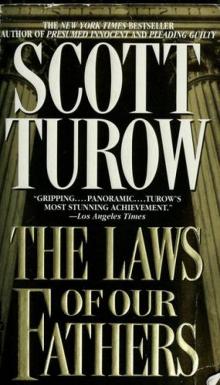 The Laws of Our Fathers
The Laws of Our Fathers Ordinary Heroes
Ordinary Heroes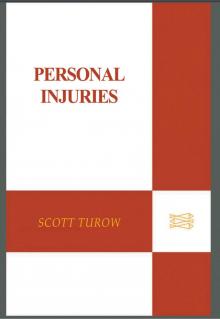 Personal Injuries
Personal Injuries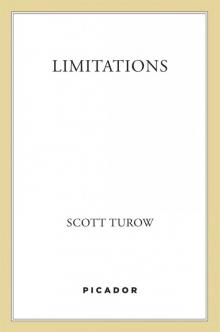 Limitations
Limitations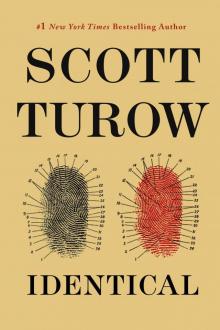 Identical
Identical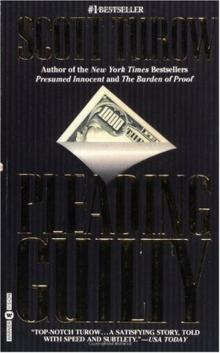 Pleading Guilty
Pleading Guilty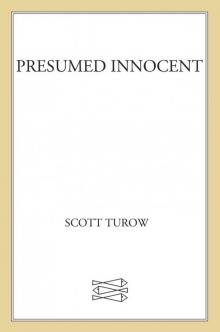 Presumed Innocent
Presumed Innocent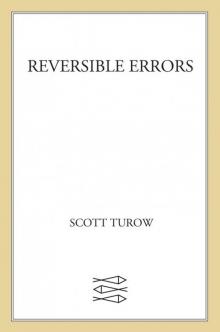 Reversible Errors
Reversible Errors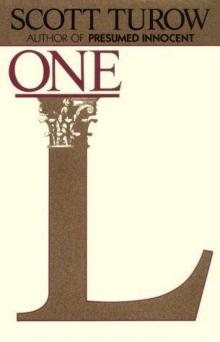 One L: The Turbulent True Story of a First Year at Harvard Law School
One L: The Turbulent True Story of a First Year at Harvard Law School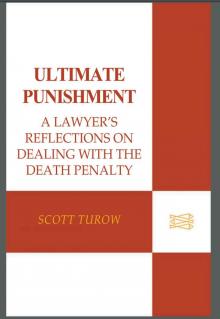 Ultimate Punishment
Ultimate Punishment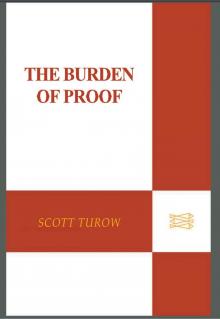 The Burden of Proof
The Burden of Proof Ordinary Heroes (2005)
Ordinary Heroes (2005)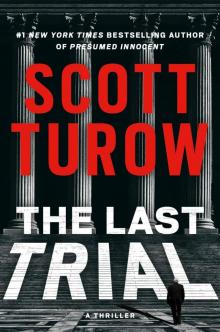 The Last Trial
The Last Trial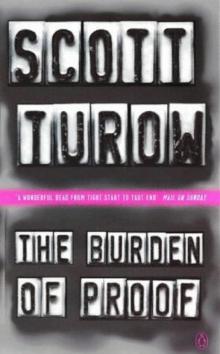 The Burden of Proof kc-2
The Burden of Proof kc-2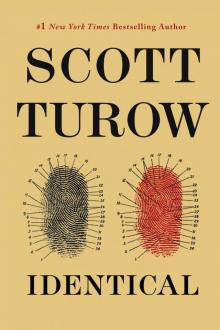 KC09 - Identical
KC09 - Identical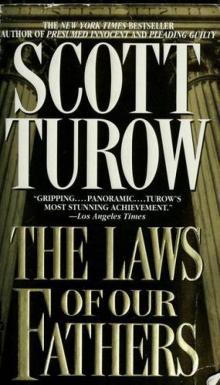 The Laws of our Fathers kc-4
The Laws of our Fathers kc-4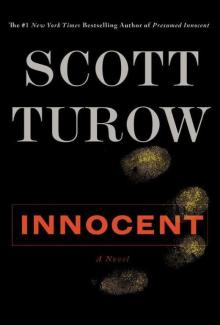 Innocent kc-8
Innocent kc-8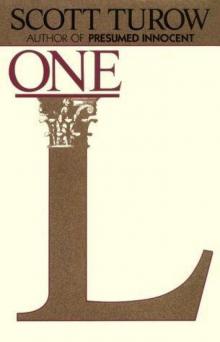 One L
One L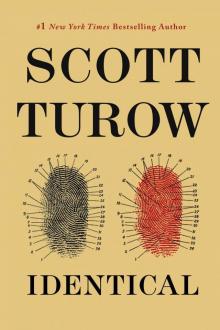 Identical kc-9
Identical kc-9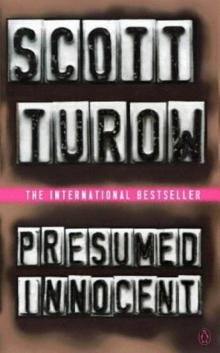 Presumed innocent kc-1
Presumed innocent kc-1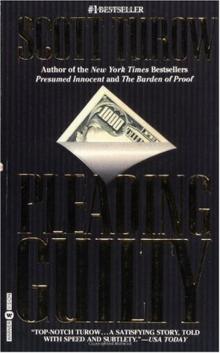 Pleading Guilty kc-3
Pleading Guilty kc-3 One L (1977)
One L (1977)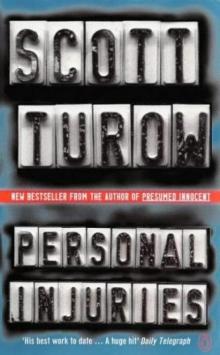 Personal injuries kc-5
Personal injuries kc-5